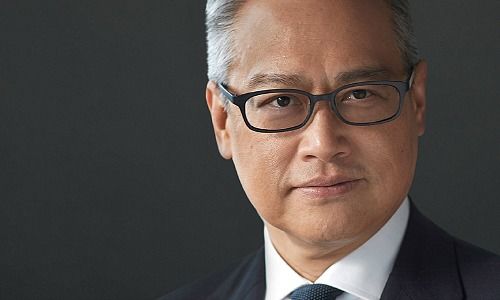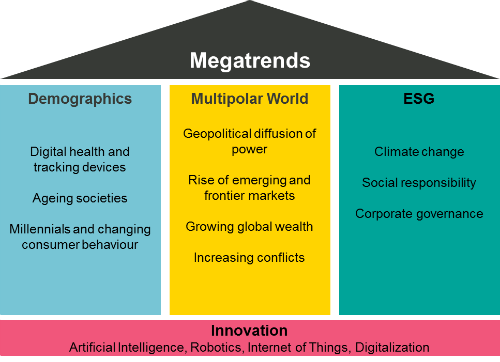Alex Fung: «Which Megatrends Should Investors Keep an Eye on?»
Demographic change, the emergence of a multipolar world order, and rules for responsible management practices are long-term changes, Alex Fung exclusively writes for finews.asia.
Today’s «silver» generation enjoys ever better physical and mental fitness, and tends to be more active and financially secure. Companies are increasingly responding to this situation with personalised offers.
To name a few examples: holiday resorts or training establishments specifically tailored to seniors’ needs, healthcare companies covering the supply of medicines or services in care facilities, or innovations such as «smart» garments that can display health data.
Changing Behaviour
Society must meet such challenges with an even stronger innovation drive, which from the investor’s perspective should in turn create long-term investment trends that are little correlated with global financial markets.
But the theme of demographics covers much more than just a focus on the needs of the older generation. It also concerns the changing consumer behaviour of younger adults or so-called millennials, as well as new products and services in areas such as mobile communication, e-commerce or e-sport.
For example, who would have imagined a few years back that the popularity of online shopping or downloadable video games would spawn a whole new brood of companies and even entire industries?
Multipolar World Order
Over the past few years, doubts have arisen about the once undisputed political and economic supremacy of the United States. On the political stage, the former «world policeman» is increasingly facing competition from China and Russia.
However, this transition from an unipolar to a multipolar order has not made the world safer. On an economic level, America is confronted with the rise of China. India also has clear ambitions to modernise its infrastructure and improve its economy.
Partly to Blame
The development in these two most populous countries of the world is representative of the potential in the emerging markets as a whole. The consultancy firm Capgemini predicts that by 2025 the number of private individuals with investible assets of one million dollars will increase significantly in the emerging economies especially.
But it’s not only America whose influence is diminishing. In general, the authority of the state seems to be waning in many regions. The growing networking of computer systems and devices (the buzzwords here are the «cloud» or the internet of things or IOT) and the ever-increasing flow of data are partly to blame.
Traditionally, central banks and governments had a monopoly on monetary and fiscal policy. Nowadays, the ability to control one’s own currency or levy taxes is questioned. Many authorities are inadequately prepared to deal with radical threats (such as hackers) or challenges such as cryptocurrencies.
Sustainable Value Creation
Nowadays, every self-respecting organisation publishes a sustainability report. This typically highlights the company’s progress in conducting its business in an environmentally friendly and socially responsible manner, according to the principles of good corporate governance.
This has practical reasons, because the absence of such a strategy can often have a negative impact on a company’s share price. There is also a growing realisation that complying with environmental, social and governance (ESG) standards should be an important aspect of every investment decision.
Breeding Ground for Innovations
Many investment portfolios reflect this fundamental approach. They often contain shares of selected companies whose products are «sustainable» – as they generate far fewer CO2 emissions than rival products, for example.
To summarise, it can be said that future growth should be achieved in a «greener», more responsible and more transparent manner. This is the breeding ground for innovation in areas such as smart grid, battery storage, renewable energy, water management, building technology, recycling or microfinance to farmers in emerging markets.
Emergence of Various Investment Styles
The goal of achieving respectable returns while at the same time meeting ESG standards (by reducing the carbon footprint, for example) has become increasingly important since the 1990s.The initiatives of American institutional investors in particular have led to the emergence of various investment styles in the asset management industry.
For example, the so-called best-in-class approach focuses on companies that surpass their competitors in terms of sector-specific environmental, social and governance (ESG) performance. According to the Global Sustainable Investment Alliance (GSIA), the market for sustainable investments has now reached a volume of almost 23 trillion dollars. This corresponds to about a quarter of all assets under management worldwide (Global Sustainable Investment Review).
(Source: Vontobel)
The Times They’re Changing…
The long-term megatrends model with its focus on consumer behaviour, the ascent of emerging markets and sustainability, offers a new orientation point for Asian investors. When new industries emerge almost daily that revolutionise established business models or even make them superfluous, focusing on selected investment themes seems a sensible approach.
Other groundbreaking innovations are expected in areas such as artificial intelligence, robotics, the IOT and digitization. Keeping an eye on «the future» has always been a priority for Asian investors – and we try to help them with this task.




























